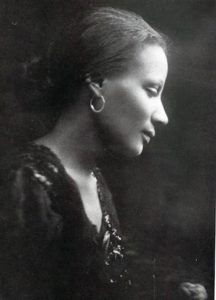
Nancy Elizabeth Prophet
*Nancy Elizabeth Prophet was born on this date in 1890. She was a Black sculptor.
An only child from Providence, Rhode Island, her father, William H. Prophet, was employed by that city, and her mother, Rose Walker Prophet, was a housewife. Encouraged by family and friends after high school, Prophet enrolled in the renowned Rhode Island School of Design, working as a domestic to pay her tuition. Her graduation and the Harlem Renaissance co-occurred, where she lived briefly.
In 1922, with financial assistance from Gertrude Vanderbilt Whitney, Prophet went to Paris to study. While there, she came to the attention of artist Henry O. Tanner. Her work impressed him, and he recommended her for the Harmon Foundation Prize, which she won. Her work was exhibited at the Paris August Salons from 1924 to 1927 and at the Salon d’Automne in 1931 and 1932. In America, her works were exhibited in group exhibitions throughout the 1930s via the Harmon Foundation and the Whitney Sculpture Biennial. In 1932, she returned to America and began teaching at Spelman College.
In 1939, Prophet began teaching at Atlanta University, where she realized there was no room for her as a Black woman to become part of the Atlanta art community. Because of this reality, she returned to Rhode Island in 1945, and the lack of contacts in her field forced her to start her career over basically. Prophet went to work as a domestic again. She did have one known one-person exhibit in 1945 at the Providence Public Library. In 1978, her pieces were part of the “Four From Providence” exhibit at the Bannister Gallery of Rhode Island College.
Elizabeth Prophet died in 1960 in poverty and obscurity.
The St. James Guide to Black Artist
Edited by Thomas Riggs
Copyright 1997, St. James Press, Detroit, MI
ISBN 1-55862-220-9